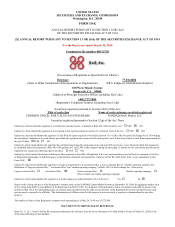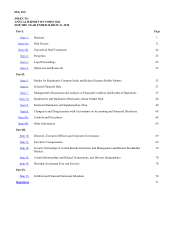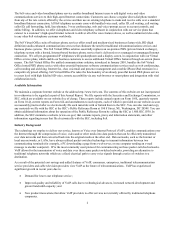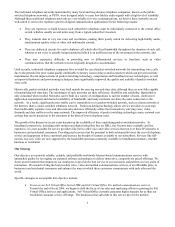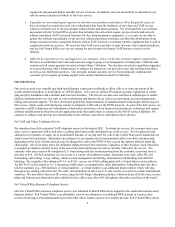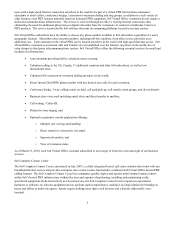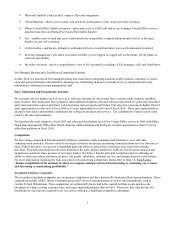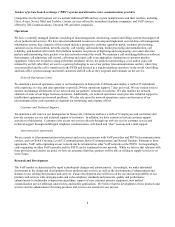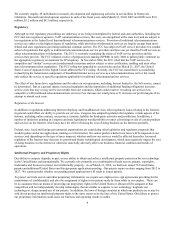8x8 2010 Annual Report Download - page 11
Download and view the complete annual report
Please find page 11 of the 2010 8x8 annual report below. You can navigate through the pages in the report by either clicking on the pages listed below, or by using the keyword search tool below to find specific information within the annual report.9
We currently employ 29 individuals in research, development and engineering activities in our facilities in Sunnyvale,
California. Research and development expenses in each of the fiscal years ended March 31, 2010, 2009 and 2008 were $5.0
million, $5.2 million and $4.3 million, respectively.
Regulatory
Although several regulatory proceedings are underway or are being contemplated by federal and state authorities, including the
FCC and state regulatory agencies, VoIP communication services, like ours, are unregulated at the state level and are subject to
less regulation at the federal level than traditional telecommunications services. Providers of traditional telecommunications
services are subject to the highest degree of regulation, while providers of information services are largely exempt from most
federal and state regulations governing traditional common carriers. The FCC has subjected VoIP service providers to a smaller
subset of regulations that apply to traditional telecommunications service providers and have not yet classified VoIP services as
either telecommunications or information. The FCC is currently examining the status of VoIP service providers and the
services they provide. The FCC initiated a notice of proposed rule-making (NPRM) in early 2004 to gather public comment on
the appropriate regulatory environment for IP telephony. In November 2004, the FCC ruled that the VoIP service of a
competitor and "similar" services are jurisdictionally interstate and not subject to state certification, tariffing and most other
state telecommunications regulations. The FCC ruling was appealed by several states and on March 21, 2007, the United
States Court of Appeals for the Eighth Circuit affirmed the FCC ruling. Recently, the FCC has stated that it is considering
reclassifying the transmission component of broadband Internet access services as a telecommunications service but would
only subject the service to specific regulations applicable to traditional telecommunications services.
The effect of any future laws, regulations and the orders on our operations, including, but not limited to, the 8x8 service, cannot
be determined. But as a general matter, increased regulation and the imposition of additional funding obligations increases
service costs that may or may not be recoverable from our customers, which could result in 1) making our services less
competitive with traditional telecommunications services if we increase our retail prices or 2) decrease our profit margins if we
attempt to absorb such costs.
Regulation of the Internet
In addition to regulations addressing Internet telephony and broadband services, other regulatory issues relating to the Internet,
in general could affect our ability to provide our services. Congress has adopted legislation that regulates certain aspects of the
Internet, including online content, user privacy, taxation, liability for third-party activities and jurisdiction. In addition, a
number of initiatives pending in Congress and state legislatures would prohibit or restrict advertising or sale of certain products
and services on the Internet, which may have the effect of raising the cost of doing business on the Internet generally.
Federal, state, local and foreign governmental organizations are considering other legislative and regulatory proposals that
would regulate and/or tax applications running over the Internet. We cannot predict whether new taxes will be imposed on our
services, and depending on the type of taxes imposed, whether and how our services would be affected thereafter. Increased
regulation of the Internet may decrease its growth and hinder technological development, which may negatively impact the cost
of doing business via the Internet or otherwise materially adversely affect our business, financial condition and results of
operations.
Intellectual Property and Proprietary Rights
Our ability to compete depends, in part, on our ability to obtain and enforce intellectual property protection for our technology
in the United States and internationally. We currently rely primarily on a combination of trade secrets, patents, copyrights,
trademarks and licenses to protect our intellectually property. As of March 31, 2010, we had been issued 76 United States
patents and additional United States and foreign patent applications pending. Our patents expire on dates ranging from 2012 to
2027. We cannot predict whether our pending patent applications will result in issued patents.
To protect our trade secrets and other proprietary information, we require our employees to sign agreements providing for the
maintenance of confidentiality and also the assignment of rights to inventions made by them while in our employ. There can
be no assurance that our means of protecting our proprietary rights in the United States or abroad will be adequate or that
competition will not independently develop technologies that are similar or superior to our technology, duplicate our
technology or design around any of our patents. In addition, the laws of foreign countries in which our products are or may be
sold do not protect our intellectual property rights to the same extent as do the laws of the United States. Our failure to protect
our proprietary information could cause our business and operating results to suffer.

